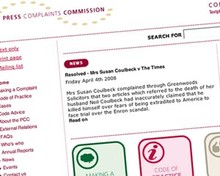
Objections relating to online material accounted for 56 per cent of the 4,340 complaints received by the PCC in 2007 with 44 per cent concerning hard-copy versions, according to a report by the body.
This is the first time the number of complaints about online articles has been higher than those relating to print editions since the commission began regulating the editorial content of publications' websites in 1997.
Stephen Abell, assistant director of the PCC, told Journalism.co.uk the figures reflect a growth in the regulator's presence online with more publishers' websites carrying the PCC's logo and contact details.
"The industry with their online presence has made the PCC more visible than it was previously. We're advertised much more on newspapers and online. If people see an article and want to complain about it, we're often just a click-through away," said Abell.
The vast majority of the complaints made about website copy related to online versions of print articles suggesting print readers were using the online complaints procedure as an effective remedy, Abell added.
"Magazines and newspapers have more of their content online so a complaint can come in immediately to our email address with a link to the article.
"The internet is a very immediately reactive medium. It's more straightforward for people to come to the PCC and that's broadly a positive thing, because we try to make the complaints process as easy as possible."
In February last year the commission extended its responsibilities to the regulation of online audio and visual content produced by publishers.
According to the body only 'a handful of complaints' has been received about this content with the majority relating to video submitted by non-journalists, such as the ruling on mobile phone footage of an unruly school class supplied by a pupil to the Hamilton Advertiser.
Only one complaint has been made so far about audio-visual content supplied by working journalists after The Guardian published a Reuters report on the subject of the Israeli-Palestinian conflict.
Free daily newsletter
If you like our news and feature articles, you can sign up to receive our free daily (Mon-Fri) email newsletter (mobile friendly).
Related articles
- 'Very strong public mood' for 'strict' press regulation, finds poll
- Jack Straw: Self-regulation defies principles of justice
- Lord Wakeham: PCC should be 'stage one' in any legal action
- PCC receives more than 100 complaints over Sun headline
- Sun journalists to be trained in mental health reporting after complaint









